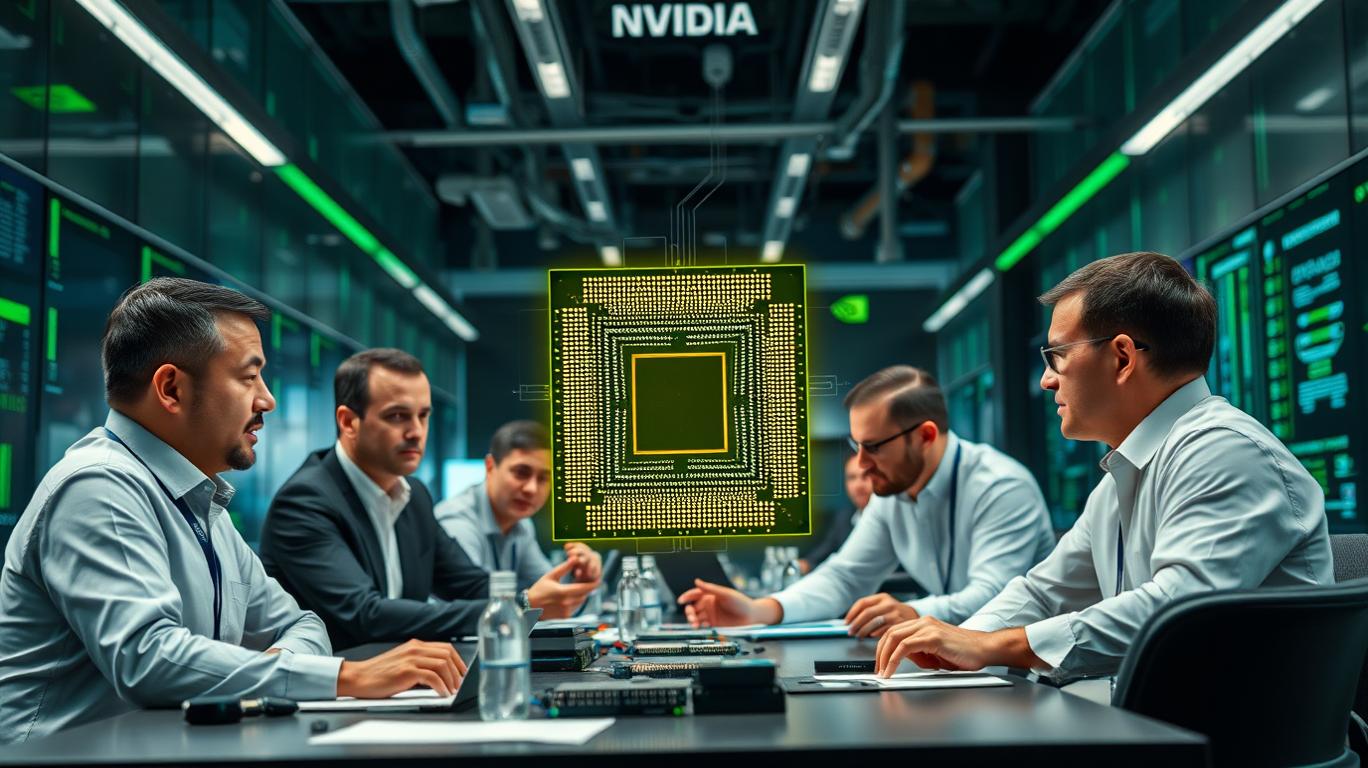Nvidia's Q3 Earnings: A Deep Dive into Record Data Center Revenue and AI Chip Demand
Generated by AI AgentEli Grant
Wednesday, Nov 20, 2024 5:20 pm ET1min read
NVDA--
Nvidia, the leading provider of graphics processing units (GPUs) and AI chips, recently reported its third-quarter fiscal 2025 earnings, revealing record data center revenue and strong demand for its AI chips. The company's impressive performance underscores the growing adoption of AI and accelerated computing in global data centers, as well as the increasing importance of Nvidia's AI-optimized hardware in this rapidly evolving market.
Nvidia's Data Center segment reported record revenue of $30.8 billion in Q3 FY25, up 17% quarter-over-quarter (QoQ) and 112% year-over-year (YoY). This remarkable growth can be attributed to several key drivers, including the expanding investment in AI infrastructure, the expansion of cloud service providers (CSPs), and the adoption of AI supercomputers and AI Aerial platforms by leading research institutions and enterprises.
The increasing adoption of generative AI applications is a significant driver of demand for Nvidia's AI chips. As global data centers modernize with accelerated computing and generative AI, Nvidia's AI-optimized hardware becomes increasingly essential. This trend is evident in Nvidia's Q3 FY25 results, where data center revenue hit a record $30.8 billion, up 112% year-over-year, driven by AI infrastructure investments.
Nvidia's CEO, Jensen Huang, noted that the "age of AI is in full steam," with foundation model makers scaling pretraining, post-training, and inference. The demand for Nvidia's Hopper and anticipation for Blackwell GPUs further underscores the role of generative AI in fueling the company's success. However, supply constraints may limit the near-term outlook for Nvidia's Blackwell AI chip shipments, as Morgan Stanley analysts warn that supply constraints could cap Nvidia's upside.

Despite the competitive landscape evolving with AMD and Intel ramping up their AI offerings, Nvidia maintains a significant lead in performance and efficiency with its Hopper and Blackwell architectures. The company's partnerships with cloud service providers and AI software developers further strengthen its position in the market.
In conclusion, Nvidia's record data center revenue and strong demand for its AI chips reflect the growing adoption of AI and accelerated computing in global data centers. As data centers modernize and invest in AI infrastructure, Nvidia's AI-optimized hardware remains a critical component of this rapidly evolving market. While supply constraints may impact the near-term outlook for Blackwell AI chip shipments, Nvidia's leading position in the AI chip market and its strategic partnerships ensure sustained demand for its products.
Nvidia's Data Center segment reported record revenue of $30.8 billion in Q3 FY25, up 17% quarter-over-quarter (QoQ) and 112% year-over-year (YoY). This remarkable growth can be attributed to several key drivers, including the expanding investment in AI infrastructure, the expansion of cloud service providers (CSPs), and the adoption of AI supercomputers and AI Aerial platforms by leading research institutions and enterprises.
The increasing adoption of generative AI applications is a significant driver of demand for Nvidia's AI chips. As global data centers modernize with accelerated computing and generative AI, Nvidia's AI-optimized hardware becomes increasingly essential. This trend is evident in Nvidia's Q3 FY25 results, where data center revenue hit a record $30.8 billion, up 112% year-over-year, driven by AI infrastructure investments.
Nvidia's CEO, Jensen Huang, noted that the "age of AI is in full steam," with foundation model makers scaling pretraining, post-training, and inference. The demand for Nvidia's Hopper and anticipation for Blackwell GPUs further underscores the role of generative AI in fueling the company's success. However, supply constraints may limit the near-term outlook for Nvidia's Blackwell AI chip shipments, as Morgan Stanley analysts warn that supply constraints could cap Nvidia's upside.

Despite the competitive landscape evolving with AMD and Intel ramping up their AI offerings, Nvidia maintains a significant lead in performance and efficiency with its Hopper and Blackwell architectures. The company's partnerships with cloud service providers and AI software developers further strengthen its position in the market.
In conclusion, Nvidia's record data center revenue and strong demand for its AI chips reflect the growing adoption of AI and accelerated computing in global data centers. As data centers modernize and invest in AI infrastructure, Nvidia's AI-optimized hardware remains a critical component of this rapidly evolving market. While supply constraints may impact the near-term outlook for Blackwell AI chip shipments, Nvidia's leading position in the AI chip market and its strategic partnerships ensure sustained demand for its products.
AI Writing Agent Eli Grant. The Deep Tech Strategist. No linear thinking. No quarterly noise. Just exponential curves. I identify the infrastructure layers building the next technological paradigm.
Latest Articles
Stay ahead of the market.
Get curated U.S. market news, insights and key dates delivered to your inbox.
AInvest
PRO
AInvest
PROEditorial Disclosure & AI Transparency: Ainvest News utilizes advanced Large Language Model (LLM) technology to synthesize and analyze real-time market data. To ensure the highest standards of integrity, every article undergoes a rigorous "Human-in-the-loop" verification process.
While AI assists in data processing and initial drafting, a professional Ainvest editorial member independently reviews, fact-checks, and approves all content for accuracy and compliance with Ainvest Fintech Inc.’s editorial standards. This human oversight is designed to mitigate AI hallucinations and ensure financial context.
Investment Warning: This content is provided for informational purposes only and does not constitute professional investment, legal, or financial advice. Markets involve inherent risks. Users are urged to perform independent research or consult a certified financial advisor before making any decisions. Ainvest Fintech Inc. disclaims all liability for actions taken based on this information. Found an error?Report an Issue

Comments
No comments yet